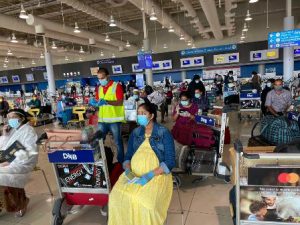Vande Bharat Mission: Complex and Tricky
Will the Vande Bharat Mission ensure safe passage of Indians stranded abroad and simultaneously prevent the spreading of COVID-19 carriers?

The massive government response to the global pandemic COVID-19 has brought in a national expedition, ‘Vande Bharat Mission’, for repatriation of Indian nationals stranded in foreign countries. The mission by the Indian government is most complex and tricky in light of the current rise in the COVID-19 cases in the country. The Ministry of External Affairs (MEA) has been busy since 7 May in coordinating the operational, technical and medical considerations with diverse stakeholders involved in the mission. Following a hub-and-spoke model, passengers are to be brought in from different registered destinations to the destined port, from where they will be quarantined, and medical tests are undertaken. Emphasising on prioritising elderly, sick, pregnant women, and children as top most in the mission list to return home, as against the estimated 1.4 crore Indians staying in different countries. In the first phase of the mission which started on 7 May, an estimate of 60 non-scheduled commercial flights operated from around 12 foreign countries in bringing back about 15,000 nationals. The second phase began on the third week of May to cover the European nations, and further talks are on the third phase, including the involvement of private planes for the same.
Also Read : Migrant Workers From The Gulf An Exodus That Cant Be Downplayed
Premeditating the biggest evacuation mission in Indian history before its launching comes with lot of considerations to be reviewed thoroughly. For instance, the preponderance of rising number of COVID-19 cases in foreign countries, such as in the United States, Russia, Brazil, the United Kingdom and the Gulf, all the more reason of higher risk of bringing home possible carries of COVID-19 from such countries. Sources state that more than 10,000 Indians in the Gulf regions have contracted the coronavirus, out of which 84 of them have died.
The MEA and its missions are working hand-in-hand with Minsters of Civil Aviation, Home Affairs, Health and Family Welfare, Bureau of Immigration, along with concerned state governments.
The union government itself is faced with the campaign against COVID-19 pandemic and has been coordinating with states on guidelines while imposing lockdown rules and quarantine modalities. The scepticism observed by India during initial days of lockdown, when passengers took the first relief trains from Delhi to various cities, hostile migrant workers wanting to return to home states, or the instances where labourers strictly quarantined in facilities in Uttar Pradesh and Bihar escaped the norms. Elaborating further on different health protocols exercised in different states will only point out the failures and inadequacies in consensus building.

However, in contrast to prevention of spreading of COVID-19 within boundaries of Indian states during the lockdown, the union government, with assistance of MEA in coordination with all states are prepared by agreeing on the uniform guideline of quarantine, accommodation and stringent health protocols to all returnees. Options with respect to free and official accommodation or private hotels are rendered to anyone who wants it. Although, the health ministry has issued an approval of home quarantine for those with virus, which is deemed to be very mild cases of pre-symptomatic. It is an intimidating position for India as it has crossed 132, 000 COVID-19 cases depending on joint action of the states as well as foreign nations in order to prevent any possibilities of touch during the entire journey of the returnee. Since 7 May the rising number of returnees on Vande Bharat Mission further indicates the paramount pressure on public facilities and institutional capacity in the coming weeks.
In accordance with Article 43 of the International Health Regulations (2005), the State parties should inform WHO about the additional health protocols that interfere with international traffic. WHO has recommended countries to be prepared with containment such as active surveillance, early detection, quarantine, and case management as well as contact tracing and prevention of onward spread of the infection. A well-established and stringent health protocols are set in order for flights, ships, trains or any other mode of transportation under Vande Bharat Mission. A full medical screening is conducted on passengers in intervals, and in rare situations, where such passengers are tested positive, they are not allowed to board. A complete medical test is followed before embarkation and on disembarkation, and a comprehensive health protocol is imposed along the course of the journey. Violation or not abiding by set protocols will only invite more trouble and legal strains. Number of seats on the flight is limited as the norms of social distancing are exercised, wherever possible. Soon after undergoing the medical screening before the boarding and on arrival, the returnees are greeted by officials in personal protective equipments (PPE), who undertake primary questionnaire and screening as well as disinfect the luggage.
Also Read : Gulf Deaths Parliament Responds With Madad Portal Rti Activist Urges For Detailed Study
The passengers are directed to download and register on Aarogya Setu app. The app developed amidst the COVID-19 pandemic with an aim to keep track of other app users that the person has come in contact with.
Developed by the National Informatics Centre (NIC) under the Ministry of Electronics and Information Technology, the app alerts the users of any contacts of positive COVID-19.
As part of the health protocol, the passengers on arrival are strictly mandated to undergo 14-days quarantine in an institutional facility or paid private hotel facilities. They are taken directly to the preferred accommodation by ambulance or any other such mode of transport that exercise preventive norms of social contacts. On arrival at the accommodation facility, the passengers are taken directly to the room, where adequate food and water, including sleeping arrangements are provided. The health protocols have strictly provided for adherence to measures and basic PPEs to be practiced when in contact with such returnee passenger from the point of arrival on any of the states to the accommodation facility till the end of the quarantine period.
Unexpectedly, the mission of repatriation has been welcomed by the returnees, who wish to return home to India and saw no point in being isolated in foreign countries, where they have been residing. With the slight easing of lockdown within states, the domestic flights as well as feeder flights have started their operations in order to achieve the mission in adherence to travel restrictions of COVID-19 prevention guidelines. The massive repatriation initiative of Vande Bharat Mission deliberately planned by the Indian government uniformly coordinated with state government in bringing back home the stranded Indians from different parts of the world during the pandemic is a brave move and shows concern for its nationals.
